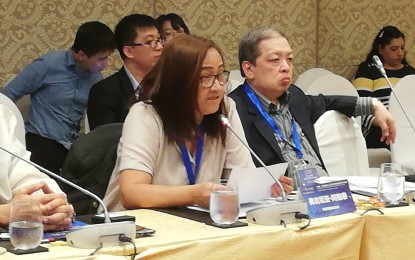
NEW DOORS. PCOO-NIB Director Virginia Arcilla-Agtay (center) speaks during the BRI Philippine-China sub-forum on think tank and media dialogue during the Belt and Road Initiative (BRI) Forum held at the Sofitel Hotel in Pasay City on Friday (July 26, 2019). She said the Belt and Road Initiative opens more opportunities to strengthen understanding between China and the Philippines through media and cultural exchanges. (PNA photo by Joyce Ann L. Rocamora)
MANILA -- An official of the Presidential Communications Operations Office (PCOO) said Friday the Belt and Road Initiative (BRI) opens more opportunities to strengthen understanding between China and the Philippines through media and cultural exchanges.
"Though its main thrust is economic development, it undeniably opens doors for promoting cooperation in other aspects, such as culture and media," Virginia Arcilla-Agtay, director of the PCOO News and Information Bureau (NIB) told a panel during the BRI Philippine-China Forum in Pasay City.
With the BRI, she said, both Philippine and Chinese citizens will be exposed to what each other has to offer in the form of products and services.
"Since our cultural identities always come intact with such, cultural exchange is simultaneously carried out," Arcilla-Agtay said.
At the same time, she said, the big-ticket infrastructure projects between China and the Philippines require agreements and heavy coverage thus, the BRI opens opportunities for dialogues and interaction between the two states.
"In the same way, each time a door for a better understanding of each other opens, so will one for our media cooperation. After all, any act of synergy between our countries is always worth being made known," she said.
Important role
Arcilla-Agtay underscored that media plays a pivotal role in strengthening partnerships between states, particularly in improving ties with non-traditional partners like China.
"It is natural for states to lean towards skepticism in international affairs if there is little to no transparency. Media appeases this by the proper dissemination of information, so citizens do not remain in the dark," she said.
"It is in this manner that Philippine and Chinese media can work together to promote mutual understanding. We can keep each other up to date regarding relevant current events, dispel further misunderstandings in areas of conflict, foster media transparency between each other, and in turn build trust and open doors for cooperation," she added.
During the panel discussion, Arcilla-Agtay raised the need to "work towards a vision where our countries will freely converse and support each other because trust has already been built and is continually being strengthened by media cooperation."
"Let us look at our differences as varieties that enrich our society, our nations, and our Asian continent as a whole," she said.
Expanding network
On government media alone, Arcilla-Agtay shared that the Philippine News Agency, Radyo Pilipinas, and PTV4 are already engaging China and the states included in the BRI through their participation in a media network.
"The PNA is part of Belt and Road News Alliance (BRNI). It's an international news media association officially launched on May 14, 2017," she said adding that the alliance is composed of media organizations in countries involved in China's BRI.
The BRNI, to date, includes about 72 media organizations from 42 countries and regions.
Through this arrangement, Arcilla-Agtay said the state-run media are allowed to pick up vetted news materials and share their content with BRI member-states.
"Being a news aggrupation, from their side alone, we get an array of stories to select from,” she added. (PNA)
